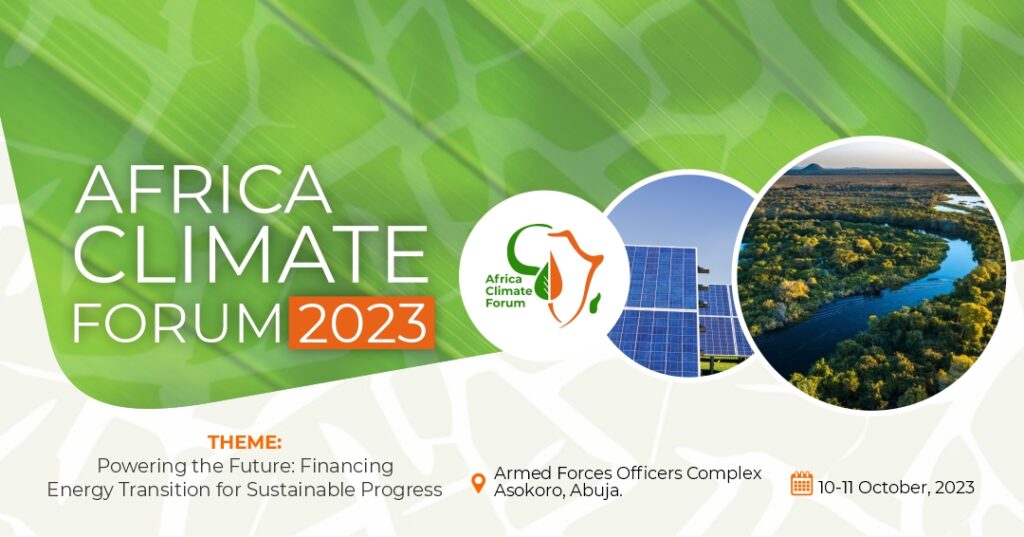Organisers: Global Centre for Law, Business and Economy (GCLBE)
Event Dates: October 10-11, 2023
Venues: Armed Forces Officers’ Complex, Asokoro, Abuja
Introduction
The maiden Africa Climate Forum which will focus on Financing Energy Transition is a two-day event that aims to bring together government officials, industry experts, policymakers, investors, academics, and key stakeholders from around the world to discuss and strategize ways to accelerate the global transition to sustainable and renewable energy sources. The conference will focus on exploring innovative financing mechanisms and solutions to drive investment in clean energy projects and technologies.

Background
As the world faces pressing challenges related to climate change and environmental sustainability, the need for transitioning to cleaner and more sustainable energy sources becomes paramount. While significant progress has been made in the development of renewable energy technologies, the financing gap for large-scale projects remains a significant hurdle especially in Africa. This conference will provide a platform to address these challenges and explore opportunities for mobilizing the necessary funds to expedite the energy transition across the continent.
Objectives of the African Climate Forum
The primary objectives of this edition of the African Climate Forum on Financing Energy Transition are to:
- Raise awareness about the urgency and importance of financing the global energy transition.
- Showcase successful energy transition projects and their financing models.
- Facilitate knowledge exchange and networking among participants from diverse backgrounds.
- Identify barriers and challenges in financing renewable energy projects and explore potential solutions.
- Encourage collaboration between public and private sectors to foster sustainable investment in clean energy.
Conference Topics
The conference will feature a comprehensive range of topics, including but not limited to:
- Innovative financing mechanisms for renewable energy projects.
- Public policy and regulatory frameworks to attract private investment.
- Role of multilateral organizations in supporting the energy transition.
- Green bonds and sustainable finance instruments.
- Decentralized and community-driven financing models.
- Energy storage technologies and investment opportunities.
- The role of technology and digitalization in optimizing energy investments.
- Case studies of successful energy transition initiatives.
Format and Activities
The two-day conference will consist of a mix of activities, including:
- Keynote speeches from renowned experts in the energy and finance sectors.
- Panel discussions featuring industry leaders and policymakers.
- Interactive workshops and breakout sessions to foster in-depth discussions.
- Networking opportunities to facilitate collaborations and partnerships.
- Exhibitions showcasing innovative energy technologies and projects.
Target Audience
The conference is open to participants from various sectors, including:
- Government representatives and policymakers.
- Energy and infrastructure investors.
- Renewable energy project developers and operators.
- Financial institutions and banks.
- Academics, researchers, and think tanks.
- Energy technology providers and startups.
- Non-governmental organizations (NGOs) and international organizations.
Outcomes
- The African Climate Forum on Financing Energy Transition aims to achieve the following outcomes:
- Actionable insights on how to attract more investments in renewable energy.
- Identification of potential collaborations and partnerships among stakeholders.
- An increased understanding of the policy and regulatory landscape for energy transition financing.
- The establishment of a platform for ongoing dialogue and knowledge sharing.
- Increased awareness about the financial benefits of sustainable energy investments.
Call to Action
Participants will be encouraged to commit to tangible actions that support the financing of energy transition projects and contribute to the broader sustainable development goals.
Theme: “Powering the Future: Financing Energy Transition for Sustainable Progress”
Explanation:
The proposed theme, “Powering the Future: Financing Energy Transition for Sustainable Progress,” emphasizes the critical role of financing in driving the transition to clean and sustainable energy sources. The theme captures the urgency of addressing climate change and underlines the need for collaborative efforts to fund innovative energy projects and technologies. By framing the conference around “Powering the Future,” it highlights the positive impact of sustainable energy on global progress and development including Africa.
Key Elements of the Theme:
“Powering the Future”: This phrase conveys the idea of energy being the driving force behind progress and development. It symbolizes the significance of sustainable energy in creating a better and more prosperous future for communities and economies worldwide.
“Financing Energy Transition”: The theme’s focus on financing emphasizes the importance of mobilizing financial resources to support the transition to renewable energy sources. It recognizes the challenges of bridging the financing gap and encourages discussions on viable financial models and innovative mechanisms.
“Sustainable Progress”: This part of the theme highlights the long-term vision of sustainability. It emphasizes that transitioning to clean energy not only benefits the environment but also contributes to economic growth, social equity, and a better quality of life for all.
Rationale for the Theme:
Relevance: The theme addresses the current global concerns regarding climate change and the urgent need to shift towards sustainable energy sources. It aligns with the increasing focus on renewable energy projects and technologies.
Engagement: “Powering the Future” evokes a sense of purpose and encourages stakeholders to actively engage in discussions, collaborations, and actions that lead to tangible outcomes.
Inspiration: The theme aims to inspire participants to envision a future where clean energy drives progress and prosperity, motivating them to explore innovative solutions and financing models.
Inclusivity: By emphasizing “Sustainable Progress,” the theme acknowledges the multidimensional aspects of the energy transition, encouraging diverse perspectives from various sectors to contribute to the dialogue.
Overall, “Powering the Future: Financing Energy Transition for Sustainable Progress” provides a compelling and action-oriented framework for the African Climate Forum, fostering meaningful discussions, partnerships, and commitments towards a more sustainable and energy-efficient future.
Conclusion
The African Climate Forum presents a unique opportunity for stakeholders to come together, learn from each other, and collectively pave the way for a greener and more sustainable energy future. By combining expertise, experience, and innovative ideas, we can accelerate the global energy transition and mitigate the impacts of climate change.
For registration and other info, visit www.africaclimateforum.com